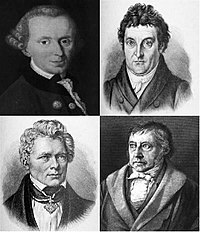Our website is made possible by displaying online advertisements to our visitors.
Please consider supporting us by disabling your ad blocker.
German idealism

German idealism is a philosophical movement that emerged in Germany in the late 18th and early 19th centuries. It developed out of the work of Immanuel Kant in the 1780s and 1790s,[1] and was closely linked both with Romanticism and the revolutionary politics of the Enlightenment. The period of German idealism after Kant is also known as post-Kantian idealism or simply post-Kantianism.[2] One scheme divides German idealists into transcendental idealists, associated with Kant and Fichte, and absolute idealists, associated with Schelling and Hegel.[3]
- ^ Beiser, Frederick C. (2002). German Idealism: The Struggle Against Subjectivism, 1781–1801. Vol. Part I. Harvard University Press.
- ^ Pinkard, Terry (2002). German Philosophy 1760–1860: The Legacy of Idealism. Cambridge University Press. p. 217.
- ^ Dunham, Jeremy; Grant, Iain Hamilton; Watson, Sean (2011). Idealism: A History of a Philosophy. Durham: McGill-Queen's University Press. p. 303 n. 4.
Previous Page Next Page


